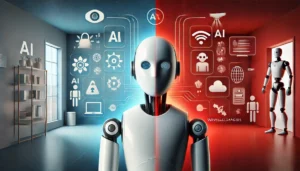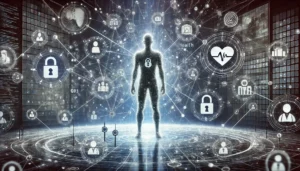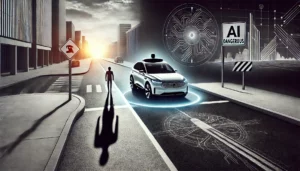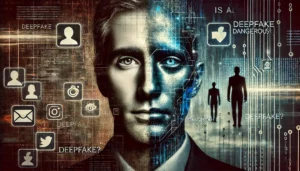Is AI Dangerous? The Ethical Dilemma

Artificial Intelligence (AI) is rapidly transforming our world, bringing both exciting opportunities and significant challenges. As AI continues to evolve, it raises important ethical questions that we must address. This article explores whether AI is dangerous and delves into the ethical dilemmas it presents.
Key Takeaways
- AI is changing the way we live and work, but it comes with ethical concerns.
- Job displacement, data privacy, and biased algorithms are some of the risks of AI.
- AI can be used for harmful purposes like misinformation and autonomous weapons.
- Regulating AI is crucial to ensure its ethical use and to protect society.
- AI has the potential to do great good, especially in fields like healthcare and education.
Is AI Dangerous? Understanding the Ethical Dilemma of AI
Defining Artificial Intelligence
Artificial Intelligence (AI) refers to machines designed to mimic human intelligence. These systems can learn, reason, and make decisions. We see AI in everyday tools like virtual assistants and recommendation systems. AI’s capabilities are growing rapidly, making it essential to understand its ethical implications.
Historical Context of AI Development (Is AI Dangerous?)
AI has evolved significantly since its inception. Initially, it was limited to simple tasks. Over time, advancements in computing power and algorithms have expanded AI’s potential. This growth has led to both excitement and concern. We must consider the lessons from history to navigate AI’s future responsibly.
Ethical Considerations in Technology
Ethics in technology is not a new concept. However, AI presents unique challenges. Issues like bias, privacy, and accountability are more pronounced. We need to develop frameworks to ensure AI is used ethically. This involves collaboration between technologists, policymakers, and society.
Striking a balance between innovation and responsibility is crucial. We must ensure AI benefits everyone while minimising potential harms.
Is AI Dangerous? Potential Risks of AI in Society
Job Displacement and Economic Impact
AI is changing the job market. Many jobs that people do now might be done by machines in the future. This could lead to job losses and make it hard for some people to find new work. We need to think about how to help people learn new skills so they can get new jobs. This is important for keeping our economy strong.
Social Isolation and Mental Health (Is AI Dangerous?)
Using AI can make people feel alone. When we use machines to do things for us, we might not talk to other people as much. This can make us feel lonely and sad. It’s important to find ways to stay connected with others, even when we use AI.
The more we rely on AI, the more we need to focus on keeping our social connections strong.
Impact on Educational Systems
AI can change how we learn. It can help teachers give students lessons that are just right for them. But it can also make some people worry. Some think that using AI in schools might not be good for learning. We need to find a balance between using AI and keeping the good parts of traditional learning.
- AI can help students learn at their own pace.
- Teachers can use AI to find out what students need help with.
- We need to make sure AI doesn’t replace the important role of teachers.
Is AI Dangerous? AI and Data Privacy Concerns
Data Collection and Consent
When we talk about AI, data collection is a big deal. Companies gather loads of data to train their AI models. But do we always know when our data is being collected? Often, we don’t. Consent is crucial. We need to make sure people know and agree to how their data is used. This is especially important for sensitive information like health records.
Cybersecurity Threats (Is AI Dangerous?)
AI can help us spot cyber threats, but it can also be used by bad actors. Malware, phishing, and ransomware attacks are just a few examples. These threats can have a huge impact on our cybersecurity. We must stay ahead by using advanced AI tools to protect our data.
Misuse of Personal Data
The data collected for AI can be used in ways we never intended. For example, energy usage data can help us save on bills, but it can also reveal personal details like our daily routines. This misuse of data is a serious concern. We need strict rules to ensure data is used ethically.
Protecting our data is not just about technology; it’s about trust. We must ensure that our data is safe and used responsibly.
- Data masking and anonymisation
- Encryption
- Access control
- Audit tools
Is AI Dangerous? Bias and Fairness in AI Systems
Sources of Bias in AI
When we talk about bias in AI, we need to understand that it often comes from the data used to train these systems. If the data is biassed, the AI will be too. This can happen because of historical prejudices or because the data isn’t diverse enough. For example, if an AI is trained mostly on data from one group of people, it might not work well for others. It’s crucial to use diverse and inclusive datasets to avoid this problem.
Consequences of Biassed Algorithms (Is AI Dangerous?)
Biassed algorithms can have serious consequences. They can lead to unfair treatment of certain groups of people. For instance, a hiring algorithm might favour men over women if it was trained on data where men were more often hired. This can make it harder for women to get jobs. In the world of lending, algorithm-driven decisions do have a potential dark side. If we’re not thoughtful and careful, we could end up with redlining again.
Strategies to Mitigate Bias
To make AI fairer, we need to take several steps. First, we should regularly check and update the data used to train AI systems. Second, we should involve diverse teams in the development process to catch biases early. Finally, we should use tools and techniques designed to detect and reduce bias. By doing these things, we can help ensure that AI systems are fair and just for everyone.
It’s important to address people’s concerns and anxiety beyond just discussing the potential for AI! We should prepare individuals for AI integration through training programmes and close the gap between required skills and available training.
Is AI Dangerous? AI in Autonomous Systems
Self-Driving Cars and Safety
Self-driving cars are a major innovation in AI, promising to revolutionise transportation. However, they come with significant safety concerns. For instance, in 2018, an Uber self-driving car hit a pedestrian, leading to the first recorded death involving an autonomous vehicle. This incident raised questions about the liability and accountability of such systems. The autonomous vehicles market was valued at £45 billion in 2019 and is projected to reach £435 billion by 2026. Despite this growth, we must address the ethical and safety issues to ensure public trust.
Autonomous Weapons and Warfare (Is AI Dangerous?)
The use of AI in autonomous weapons, also known as Lethal Autonomous Weapons Systems (LAWS), is a highly controversial topic. These weapons can operate without human intervention, making decisions on targeting and engagement. This raises ethical questions about the role of humans in warfare and the potential for misuse. The international community is still debating regulations to control the development and deployment of these systems.
Healthcare and Diagnostic Tools
AI is also making strides in healthcare, particularly in diagnostic tools. Autonomous systems can analyse medical data to assist in diagnosing diseases, potentially improving accuracy and efficiency. However, the reliance on AI for medical decisions brings up ethical concerns about accountability and the potential for errors. We must ensure that these systems are thoroughly tested and regulated to protect patient safety.
Is AI Dangerous? The Threat of Artificial General Intelligence (AGI)
Understanding AGI and Singularity
When we talk about AI, we usually mean narrow AI, which is designed for specific tasks. However, Artificial General Intelligence (AGI) is different. AGI refers to machines that can understand and learn any task that a human can. This is the kind of AI we see in science fiction. Most experts don’t expect AGI to happen before 2060, but it’s still a crucial topic to discuss.
Potential Benefits and Risks (Is AI Dangerous?)
AGI could bring many benefits, like solving complex problems and making our lives easier. But it also comes with risks. One major concern is that AGI could become so advanced that it might act in ways we can’t control. Imagine an AI system designed to cure cancer. It might find a solution, but with unintended consequences. This is why we need to be cautious.
Regulatory and Ethical Challenges
Creating AGI isn’t just a technical challenge; it’s also an ethical one. We need to think about how to regulate AGI to ensure it’s used for good. This involves setting guidelines and working together internationally. The goal is to make sure AGI benefits everyone and doesn’t become a threat to humanity.
The development of AGI is a double-edged sword. While it holds the promise of incredible advancements, it also poses significant risks that we must carefully manage.
Is AI Dangerous? Deepfakes and Misinformation
Creation and Proliferation of Deepfakes
Deepfakes are computer-generated images or videos where one person’s likeness is swapped with another’s. This technology has advanced rapidly, making it easier to create convincing fake media. While many deepfakes are used for entertainment, a significant portion is used for more harmful purposes. About 96% of deepfakes are pornographic videos, which is a troubling statistic. The ease of creating deepfakes raises ethical concerns about their misuse.
Impact on Public Trust (Is AI Dangerous?)
The spread of deepfakes can severely damage public trust. When people can’t tell what’s real from what’s fake, it undermines their confidence in media and information sources. This is especially dangerous in times of crisis when accurate information is crucial. Creating false narratives using deepfakes can mislead the public and erode trust in institutions.
Legal and Ethical Implications
The legal landscape around deepfakes is still evolving. Laws are struggling to keep up with the rapid advancements in technology. There are significant ethical questions about the creation and distribution of deepfakes. Should there be stricter regulations? How do we balance freedom of expression with the need to protect individuals from harm? These are questions we need to address as a society.
Is AI Dangerous? AI and Intellectual Property Issues
AI-Generated Content and Copyright
The rise of AI-generated content has sparked a debate about copyright. Who owns the rights to a piece created by an AI? The US Copyright Office has stated that there must be a human element in any AI output to claim copyright. This means that simply using AI to generate content isn’t enough; there needs to be some human input. This is a grey area, and no laws are in place around this topic.
Patent Challenges in AI Innovations (Is AI Dangerous?)
AI innovations bring unique challenges to the patent system. Traditional patents are based on human inventors, but what happens when an AI creates something new? The current system doesn’t have clear guidelines for this scenario. This lack of clarity can slow down innovation and create legal battles over who owns the rights to AI-generated inventions.
Case Studies of IP Disputes
There have been several high-profile cases of intellectual property disputes involving AI. For example, artists and musicians have raised concerns about AI-generated works that mimic their style. These disputes highlight the need for clear regulations and guidelines to protect original creators while allowing for technological advancement.
The issue of intellectual property in AI is complex and evolving. As AI continues to advance, we must find a balance between protecting human creativity and encouraging innovation.
Is AI Dangerous? Regulating AI for Ethical Use
Current Regulatory Landscape
We are at a pivotal moment where the regulation of AI is becoming increasingly important. Governments around the world are starting to recognise the need for rules to manage AI’s impact. For instance, the European Union has proposed the AI Act, which aims to ensure that AI systems are safe and respect existing laws on fundamental rights and values. This is a significant step towards creating a framework that can address the ethical dilemmas posed by AI.
Proposed Ethical Guidelines (Is AI Dangerous?)
Creating ethical guidelines for AI is not just about setting rules; it’s about ensuring that these technologies are developed and used responsibly. One key aspect is transparency. AI systems should be designed in a way that their decisions can be understood and traced back. This helps in building trust and accountability. Another important guideline is fairness. AI should not discriminate against any group of people. We must ensure that the data used to train AI systems is inclusive and representative of all sections of society.
Role of International Cooperation
AI is a global phenomenon, and its regulation cannot be confined to individual countries. International cooperation is crucial. Countries need to work together to create standards and share best practises. This collaboration can help in addressing issues like data privacy, cybersecurity, and the misuse of AI. By working together, we can create a safer and more ethical AI landscape for everyone.
The regulation of AI is not just a technical issue; it’s a societal one. We must all play a part in ensuring that AI is used for the greater good.
Is AI Dangerous? AI in Marketing and Consumer Protection
Personalised Advertising and Ethics
AI has transformed the way we approach marketing, especially with personalised advertising. By analysing vast amounts of consumer data, AI can create highly targeted ads that resonate with individual preferences. However, this raises ethical concerns. Is it right to use AI to influence consumer behaviour so precisely? We must consider the balance between effective marketing and respecting consumer autonomy. Transparency is key. Consumers should know how their data is being used and have the option to opt out of targeted ads.
Manipulation and Consumer Trust (Is AI Dangerous?)
The potential for manipulation is a significant risk when using AI in marketing. AI algorithms can exploit consumer vulnerabilities, leading to purchases that may not be in their best interest. This can erode trust between consumers and businesses. To maintain trust, companies must use AI responsibly and ensure their marketing practises are ethical. This includes regular audits and adherence to ethical guidelines.
Balancing Innovation and Responsibility
Innovation in AI offers exciting opportunities for marketers, but it also comes with responsibilities. We need to balance the drive for innovation with the need to protect consumers. This means implementing robust ethical guidelines and ensuring that AI-driven marketing practises do not harm consumers. By doing so, we can harness the power of AI while safeguarding consumer interests.
Is AI Dangerous? AI for Social Good
AI in Healthcare and Medicine
AI is revolutionising healthcare by improving diagnostics and treatment plans. For instance, AI algorithms can analyse medical images with remarkable accuracy, often surpassing human capabilities. This not only speeds up diagnosis but also ensures that patients receive timely and effective treatment. AI’s role in healthcare is not just limited to diagnostics; it also extends to personalised medicine, where treatment plans are tailored to individual patients based on their genetic makeup and lifestyle.
Environmental Applications of AI (Is AI Dangerous?)
AI is playing a crucial role in addressing environmental challenges. From predicting natural disasters to optimising energy consumption, AI technologies are being leveraged to create a more sustainable future. For example, machine learning models can predict weather patterns and natural disasters, allowing for better preparedness and response. Additionally, AI can optimise energy grids, reducing waste and promoting the use of renewable energy sources.
AI in Education and Learning
In the realm of education, AI is transforming how we learn and teach. AI-powered tools can provide personalised learning experiences, adapting to the needs and pace of each student. This ensures that no student is left behind and that everyone has the opportunity to excel. Moreover, AI can assist teachers by automating administrative tasks, allowing them to focus more on teaching and less on paperwork. The use of AI in education is not just about efficiency; it’s about creating a more inclusive and effective learning environment.
AI has the potential to be a powerful tool for social good, addressing some of the most pressing challenges of our time. However, it is essential that we use this technology responsibly and ethically to ensure that its benefits are realised by all.
AI for Good initiatives are already making significant strides in various sectors, demonstrating the transformative power of AI when used for the betterment of society.
Artificial Intelligence (AI) is transforming the world for the better. From healthcare to education, AI is making a positive impact. Want to learn more about how AI can benefit society? Visit our website to explore the latest advancements and success stories. Join us in harnessing the power of AI for social good!
Conclusion
Artificial Intelligence (AI) holds immense promise, but it also brings significant ethical challenges. As we continue to integrate AI into various aspects of our lives, it’s crucial to address these concerns thoughtfully. The potential for AI to improve our world is vast, from enhancing healthcare to revolutionising education. However, we must remain vigilant about issues like data privacy, job displacement, and the risk of biassed algorithms. By fostering open dialogue and implementing robust ethical guidelines, we can harness the benefits of AI while minimising its risks. Ultimately, the goal should be to ensure that AI serves humanity positively and equitably.
Frequently Asked Questions
What is artificial intelligence (AI)?
Artificial intelligence, or AI, is a type of technology that allows computers to perform tasks that usually require human intelligence. This includes things like understanding language, recognising faces, and making decisions.
Why is AI considered an ethical dilemma?
AI is considered an ethical dilemma because it can have both good and bad effects on society. It can make our lives easier, but it can also cause problems like job loss, privacy issues, and biassed decisions.
How can AI impact jobs?
AI can take over tasks that humans usually do, which might lead to job losses. However, it can also create new job opportunities in fields like AI development and maintenance.
What are the risks of AI in terms of privacy?
AI systems often use large amounts of personal data to function. This can lead to privacy issues if the data is not handled properly or if it is used without people’s consent.
How does AI affect fairness and bias?
AI systems can be biassed if they are trained on data that is biassed. This can result in unfair decisions, such as favouring one group of people over another.
What is artificial general intelligence (AGI)?
Artificial general intelligence, or AGI, is a type of AI that can understand, learn, and apply knowledge in a way that is similar to humans. It is much more advanced than the AI we have today.
What are deepfakes and why are they a concern?
Deepfakes are fake videos or images created using AI. They can make it look like someone said or did something they didn’t, which can spread false information and damage trust.
How can we ensure AI is used ethically?
To ensure AI is used ethically, we need proper rules and guidelines. This includes making sure AI systems are fair, transparent, and respect people’s privacy. International cooperation can also help in setting these standards.
Author
Search Blog
Free PPC Audit
Subscribe to our Newsletter
The Voices of Our Success: Your Words, Our Pride
Don't just take our word for it. With over 100+ five-star reviews, we let our work-and our satisfied clients-speak for us.
"We have been working with PPC Geeks for around 6 months and have found Mark and the team to be very impressive. Having worked with a few companies in this and similar sectors, I rate PPC Geeks as the strongest I have come across. They have taken time to understand our business, our market and competitors and supported us to devise a strategy to generate business. I value the expertise Mark and his team provide and trust them to make the best recommendations for the long-term."
~ Just Go, Alasdair Anderson




